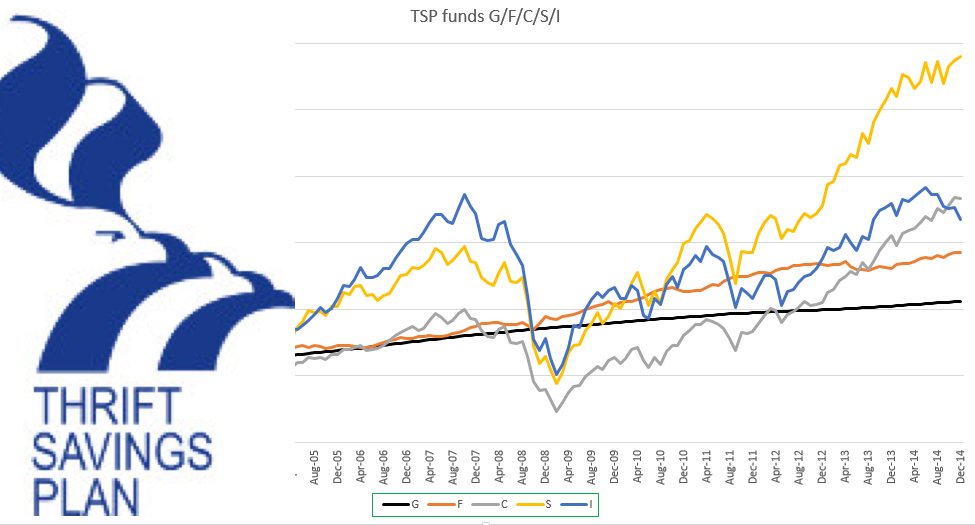When we leave the workforce, the nest egg we meticulously built up throughout our employment becomes one of three things: income, a legacy for loved ones, or tax obligations to Uncle Sam. Ideally, we prefer spending that money ourselves or knowing that the bulk of any leftover money will help our loved ones rather than the IRS.
It’s good to have a strategy in place to properly direct your hard-earned money to your heirs without losing a lion’s share to the IRS, especially since we hear more discussions about taxing inter-generational wealth and enacting higher future tax rates.
“What will happen to my TSP if I don’t use it during retirement?”
Suppose a married TSP participant dies with their spouse as the principal beneficiary. In that case, the account is retitled as a Beneficiary Participant TSP Account in your spouse’s name (as long as it has a minimum residual balance of $200). The TSP also will automatically reallocate the account to the Lifecycle Fund that best matches your spouse’s age. Spousal beneficiaries often have access to the same investment funds and similar payout options as the TSP’s original owner.
A Beneficiary Participant Account lets the spousal beneficiary keep deferring taxes on most of the account for life. It is achieved by basing the Beneficiary Participant account’s Required Minimum Distributions (RMDs) on their own life rather than the (deceased) original owner’s life expectancy. It’s a practice informally known as “stretching” the tax liability.
The ability to “stretch” the tax deferral over a more extended period implies that the money that would have otherwise been lost to taxes can now multiply in your beneficiary’s account for years. It also means that Uncle Sam generates less tax money in the short run.
That delay has become an issue as the national debt approaches $29 trillion, and we approach another run-in with the debt ceiling this autumn. Uncle Sam is no longer willing to wait decades for the tax revenue owing on an inherited IRA. As a result, it should come as no surprise that the SECURE Act of 2019 removed the ability for virtually all non-spousal beneficiaries to extend an inherited IRA for more than ten years (with several exceptions).
Non-spousal beneficiaries do not have the option of extending the tax deferral utilizing a Beneficiary Participant TSP Account under the TSP. Suppose a TSP Death Benefit is bequeathed to a non-spousal beneficiary. In that case, it is given as a single lump-sum payment, which can have significant tax implications if action isn’t done quickly.
“Who will benefit the most from my TSP account when I die?”
Imagine you have a $1,000,000 tax-deferred TSP account that you intend to give to your two children when you die, assuming that you love your children equally and want the proceeds from your TSP balance split 50/50 between them.
If nothing more is done, each of your children will get $500,000 in taxable income. These distributions would push each of them into the 35% marginal tax bracket for that year (assumption: tax rates have not been raised from 2021). If the children have their own jobs, their family income is included in the taxable TSP payout, thus increasing their marginal tax rate even further! Assume they live in a state where income tax is levied at a rate of 5%. That indicates that our aggregate tax rate might be as high as 40% (35% federal, 5% state), resulting in a $400,000 tax bill!
That only leaves $600,000 to divide among the children, leaving each with just $300,000 once the colossal tax burden is deducted. Uncle Sam, the unexpected beneficiary, has reaped the most profit from your decades of hard labor in this unfortunate scenario.
“How can I keep my Legacy tax bill as low as possible?”
If the inherited money were from a regular TSP and the children were correctly identified as beneficiaries, then they usually have a 60-day window to form an Inherited IRA and move the inherited money straight into the new account before the TSP mails out a Death Benefit. Under the new SECURE Act regulations, an eligible recipient can spread the tax burden over up to ten years by opening an Inherited IRA. That may assist keep them out of the higher marginal tax rates, lowering the overall amount of your inheritance lost to taxes.
Important: TSP profits must be transferred directly from the TSP to the Inherited IRA. The Death Benefit funds transferred to the non-spousal recipient will automatically have 20 percent deducted for taxes. The death benefit can’t be indirectly rolled into an Inherited IRA, and the TSP does not allow for a do-over.
Suppose the inherited money originated through a Beneficiary Participant TSP Account. In that case, TSP rules provide that upon the surviving spouse’s death, the entire account balance of a Beneficiary Participant TSP must be transferred straight to the beneficiary and can’t be rolled over into an Inherited IRA. That causes the same tax issue as in the preceding case, prompting many surviving spouses to consider moving their Beneficiary Participant TSP Account into an Inherited IRA. Transferring the funds to an Inherited IRA through your surviving spouse may make sense since it allows the following generation of beneficiaries to extend the tax deferral of their inheritance over ten years utilizing an Inherited IRA.
Consider the advantages of contributing to Roth accounts and using Roth conversions to help manage tax rate risk during your retirement and prevent higher future tax rates from possibly decimating the inheritance your loved ones get. Now, suppose your children inherit a qualified Roth TSP or Roth IRA. In this case, they will get a tax-free distribution of every single cent left in the account, which means that properly constructed and vested Roth accounts won’t produce a tax bill upon your death, even if tax rates rise in the following years.
Contact Information:
Email: [email protected]
Phone: 9187441333
Bio:
Mark, a lifelong Tulsan graduated from Westminster College, Fulton, Missouri with a Bachelor of Arts in Accounting. Mark served in the United States Army as a Captain in the 486th Civil Affairs BN. Broken Arrow, Oklahoma and retired in 1996. Mark is married to his high school sweetheart Jenny and has four beautiful children. Mark’s passion for his work, which includes over 20 years in the Financial Industry started as an Oklahoma State Bank Examiner. Mark examined banks throughout Oklahoma gaining a vast knowledge and experience on bank investments, small business and family investments. Mark’s experiences include being formally trained by UBS Wealth Management, a global investment firm where he served as a Financial Consultant specializing in Wealth Management for individuals & families. Mark is a licensed Series 24 and 28 General Securities Principal and an Introducing Broker Dealer Financial Operations Principal. Additionally, Mark is a Series 7 and 66 stockbroker and Investment Advisor focusing on market driven investments for individuals, businesses and their families.
Mark specializes in providing financial knowledge, ideas, and solutions for federal employees, individuals, families and businesses. We serve as your advocate, and assist you in the design and implementation of financial strategies while providing the ideas to maximize your security and wealth. Our goal is to give you maximum control of your financial future. We provide the expertise to help you with personal issues such as: practical tax Ideas, risk management, investment solutions, and estate preservation.
Additionally, we’ve counseled hundreds of employees on their transitions from careers in federal government, and private industry to their next life stage, whether that is retirement or a second career. We specialize in devising strategies that roll your TSP, 401(k), pension plan, to a suitable IRA to meet your objectives.
Disclosure:
Securities offered through GRF Capital Investors, Inc., 6506 South Lewis Avenue, Suite 160 Tulsa, OK 74136 Phone: 918-744-1333 Fax: 918-744-1564
Securities cleared through RBC Capital Markets, LLC. 60 South 6th St., Minneapolis, MN 55402
Member FINRA www.finra.org / SIPC www.sipc.org
Broker Check http://brokercheck.finra.org/








